Church elders are spiritual leaders entrusted with guiding, teaching, and protecting the congregation. Their role is rooted in biblical principles, ensuring the church’s well-being and harmony. They act as shepherds, overseeing the flock with care and wisdom, while maintaining order and unity within the body of Christ.
1.1 Definition and Role
Church elders are spiritual overseers entrusted with guiding and nurturing the congregation. Their role involves teaching, leading, and caring for members, ensuring spiritual growth and unity. Elders act as shepherds, providing wisdom and protection, while supporting pastors in preaching and ministry. They are also responsible for maintaining order and addressing spiritual needs, serving as examples of faith and integrity within the church community.
1.2 Biblical Foundation
The role of church elders is deeply rooted in Scripture, with clear references in the New Testament. Elders are appointed to shepherd the flock, as seen in Acts 20:28 and 1 Peter 5:2. Their duties are grounded in biblical teachings, emphasizing spiritual oversight, protection, and care for the congregation. The Bible outlines their qualifications and responsibilities, ensuring they lead with integrity, wisdom, and a heart for service, reflecting God’s divine plan for church leadership.
1.3 Importance in Church Governance
Elders play a vital role in church governance by providing spiritual oversight and ensuring the church operates in harmony with biblical principles. They maintain order, resolve conflicts, and guide the congregation in unity. Their leadership ensures decisions align with God’s will, fostering a healthy and thriving church environment. Elders also support pastors, enabling them to focus on preaching and teaching, while elders manage the church’s daily affairs and uphold biblical standards.
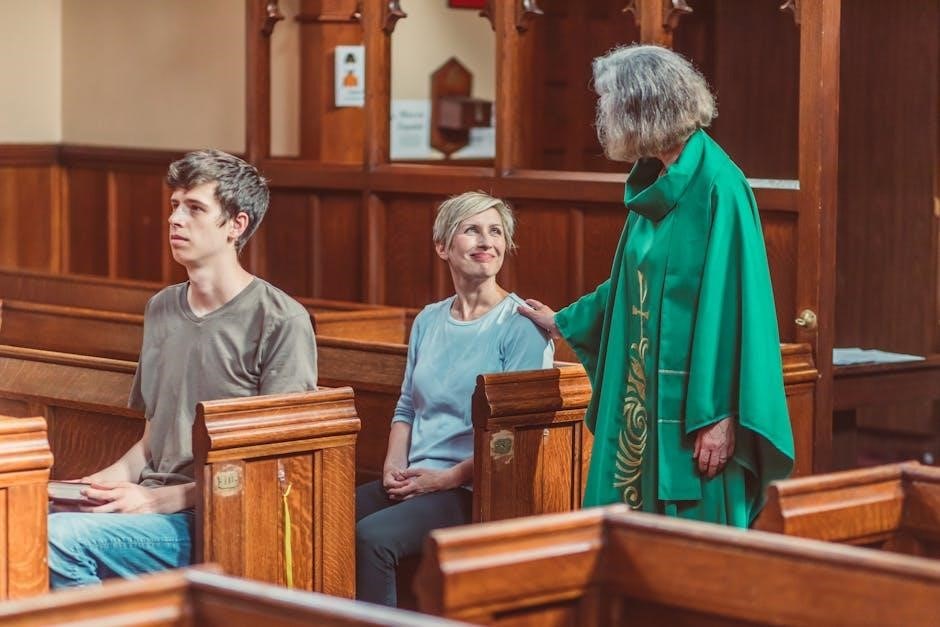
Key Responsibilities of Church Elders
Elders are responsible for spiritual leadership, teaching, pastoral care, and oversight. They guide the congregation, preach, and protect the church, ensuring its well-being and alignment with God’s Word.
2.1 Spiritual Leadership
Elders provide spiritual guidance, ensuring the church remains aligned with biblical principles. They lead by example, fostering a God-centered environment and encouraging members to grow in faith. Through prayer, teaching, and discernment, elders help the congregation navigate challenges and stay focused on Christ. Their role involves nurturing spiritual maturity and maintaining the church’s integrity, serving as humble servants who prioritize the flock’s spiritual well-being above all else.
2.2 Teaching and Preaching
Elders are entrusted with the vital task of teaching and preaching God’s Word. They ensure the congregation receives sound doctrine, equipping believers for spiritual growth and service. Through sermons, Bible studies, and personal guidance, elders clarify biblical truths, helping members apply them in daily life. Their teaching fosters unity, corrects error, and strengthens the church’s foundation in Christ, making them instrumental in the spiritual development of the flock.
2.3 Pastoral Care
Elders provide emotional and spiritual support to church members, addressing personal struggles and offering guidance. They visit the sick, comfort the grieving, and pray for those in need. This care fosters a sense of community and ensures no member feels neglected. By shepherding the flock, elders reflect Christ’s compassion and ensure the church remains a haven of love and support for all believers.
2.4 Oversight and Protection
Elders are responsible for safeguarding the spiritual integrity of the church. They ensure doctrinal purity by teaching sound doctrine and correcting false beliefs. Elders also protect the congregation from harmful influences, maintaining a safe and nurturing environment. This oversight involves discernment, prayer, and proactive leadership, ensuring the church remains aligned with God’s Word and free from division or error. Their role is both preventive and corrective, guarding the flock with wisdom and care.

Leadership and Governance
Elders provide spiritual guidance and oversight, ensuring the church operates in unity and accordance with biblical principles. They shepherd the flock, guiding decisions and maintaining harmony.
3.1 Leading by Example
Elders must lead by example, demonstrating humility, integrity, and compassion. They set a moral and spiritual standard, influencing the congregation through their actions and character. By living out their faith authentically, they inspire others to follow Christ wholeheartedly. This leadership fosters trust, unity, and accountability within the church community, ensuring a culture of shared responsibility and spiritual growth.
3.2 Decision-Making Processes
Elders engage in collective, prayerful decision-making, ensuring choices align with biblical principles and the church’s well-being. They seek God’s will, weigh opinions, and prioritize unity. Decisions are made collaboratively, avoiding authoritarianism, and are guided by Scripture. Elders also consider input from the congregation, fostering a culture of shared responsibility. This process ensures accountability, transparency, and integrity in governing the church effectively.
3.3 Collaborative Leadership
Elders practice collaborative leadership, working together to ensure unified decision-making and shared responsibilities. They support one another, avoiding dominance by a single leader, as warned in 1 Peter 5:3. This approach fosters a culture of unity, mutual respect, and accountability; By praying and seeking God’s will collectively, elders model teamwork and humility, ensuring the church benefits from diverse perspectives and strengths. This collaborative model strengthens the church’s mission and maintains harmony among its members.
Teaching and Discipleship
Elders are responsible for teaching biblical truths and guiding believers in spiritual growth. They provide mentorship, helping members live according to God’s will and deepen their faith.
4.1 Biblical Education
Elders are tasked with providing biblical education, ensuring members understand Scripture and apply it to their lives. They teach sound doctrine, lead Bible studies, and promote spiritual growth. By equipping believers with biblical knowledge, elders help the church remain grounded in truth and prepared for effective ministry and discipleship.
4.2 Mentorship
Elders are responsible for mentoring believers, guiding them in spiritual growth and leadership development. By modeling godly behavior and offering personalized guidance, elders help individuals deepen their faith and serve effectively. This relational approach fosters a culture of discipleship, equipping members to fulfill their roles within the church and beyond.
Care and Protection
Elders are entrusted with shepherding the congregation, providing spiritual support, and safeguarding members from harm. Their role ensures the flock is nurtured and protected according to God’s will.
5.1 Pastoral Care
Elders provide compassionate pastoral care, serving as spiritual shepherds. They offer counseling, visit the sick, and guide members through life’s challenges, ensuring emotional and spiritual well-being. Their role involves prayerful support, fostering unity, and addressing individual needs with empathy and wisdom, reflecting Christ’s love for His flock.
5.2 Protecting the Flock
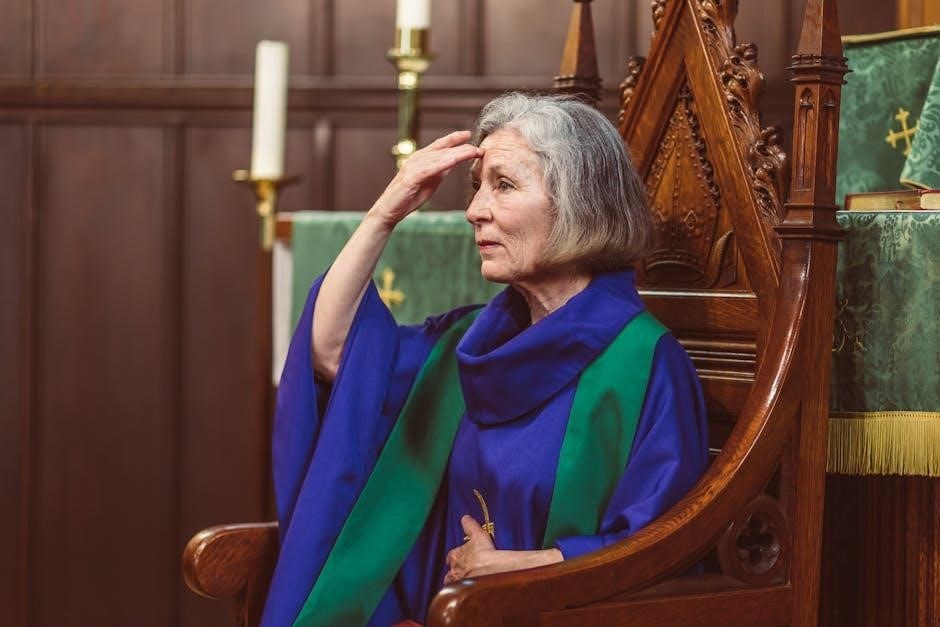
Elders are responsible for safeguarding the church from false teachings and harmful influences. They act as spiritual guardians, ensuring the congregation remains grounded in biblical truth. By maintaining order and unity, they protect members from division and confusion. Elders also provide guidance and support during challenging times, ensuring the flock remains secure under God’s care and direction.
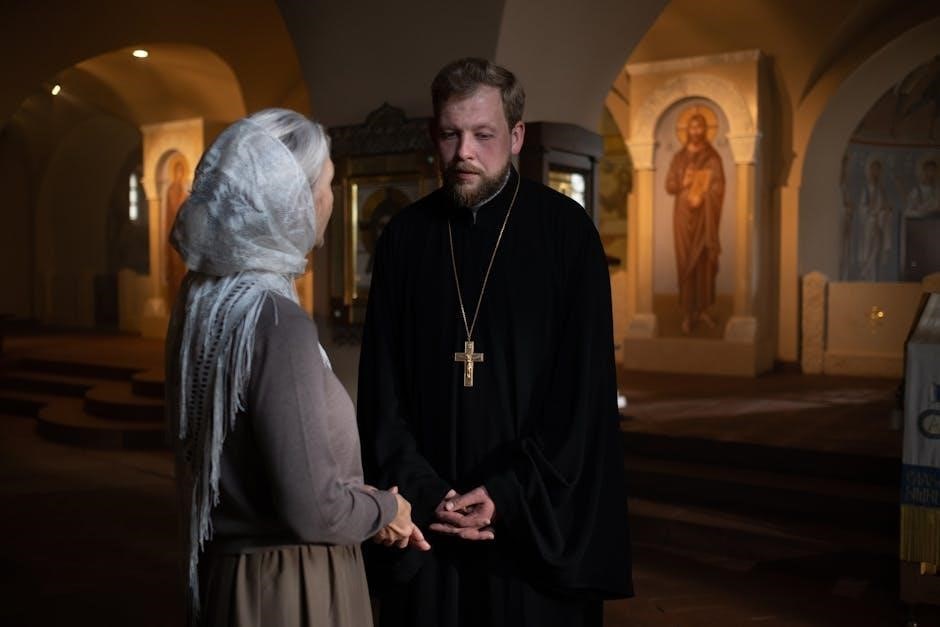
Plurality of Elders
A plurality of elders ensures shared leadership, preventing single individuals from dominating. This approach promotes unity, accountability, and collective wisdom, adhering to biblical principles for effective church governance.
6.1 Benefits of Multiple Elders
The benefits of having multiple elders include shared wisdom, diverse perspectives, and collective accountability. This approach prevents single-leader dominance, fosters unity, and ensures balanced decision-making. It also distributes responsibilities, preventing burnout and enhancing pastoral care. Biblically, plurality of elders aligns with scripture, promoting a healthier, more equitable church governance structure. This model encourages collaboration, mutual support, and a stronger sense of community within the congregation.
6.2 Avoiding Single Leadership
Avoiding single leadership prevents authoritarianism and ensures balanced governance. Multiple elders provide diverse perspectives, reducing the risk of poor decisions. Shared leadership promotes accountability, unity, and mutual support. It aligns with biblical principles, as seen in 1 Peter 5:3, which warns against lording over others. This approach prevents power imbalances and fosters a healthier, more equitable church environment, ensuring that no one person dominates the flock.
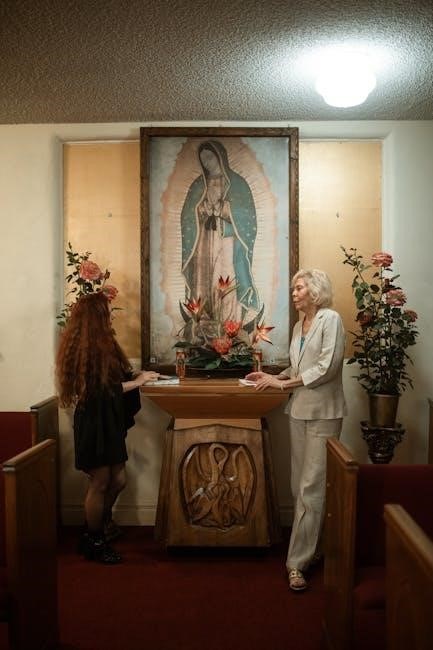
Qualifications and Characteristics
Church elders must be blameless, having one wife, and managing their household well. They should be self-controlled, hospitable, and not pursuing dishonest gain. Elders are to be respected, filled with the Spirit, and committed to serving the flock with humility and integrity.
7.1 Biblical Requirements
Elders must meet specific biblical qualifications as outlined in 1 Timothy and Titus. They are to be blameless, the husband of one wife, and manage their household well. Self-control, hospitality, and a strong grasp of Scripture are essential. They should not be lovers of money or new converts; These standards ensure elders are spiritually mature and capable of leading the church effectively.
7.2 Personal Traits
Elders should exhibit humility, integrity, and a genuine love for the church. They must be peacemakers, prayerful, and approachable. A heart for service and a willingness to invest in others are vital. Elders should also demonstrate wisdom, patience, and compassion, fostering unity and trust within the congregation. These personal traits enable them to lead effectively and model Christ-like character for the church community.
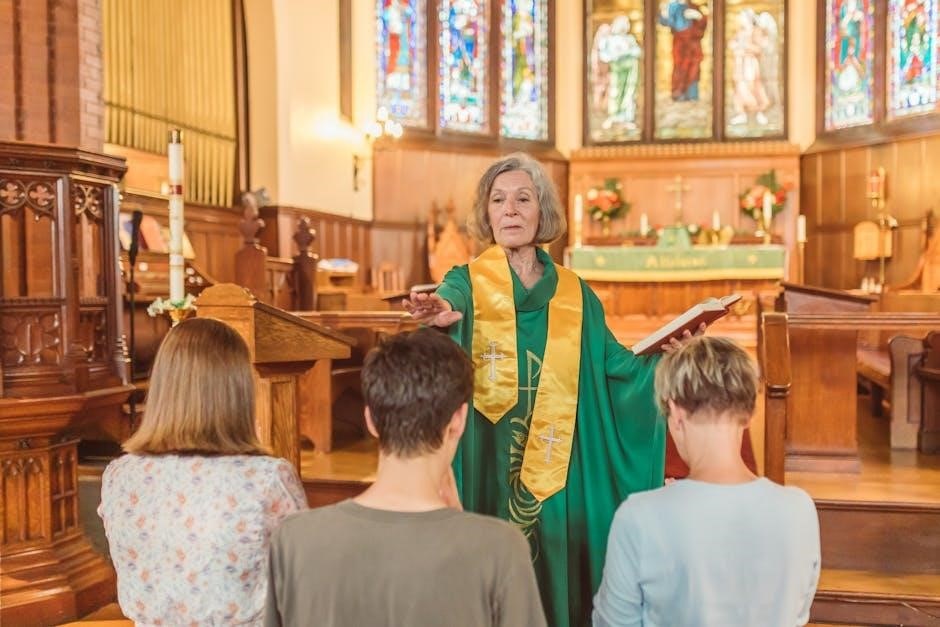
Decision-Making and Accountability
Elders make decisions collectively, guided by biblical wisdom and prayer. They are accountable to God and the church, ensuring integrity in their leadership and stewardship.
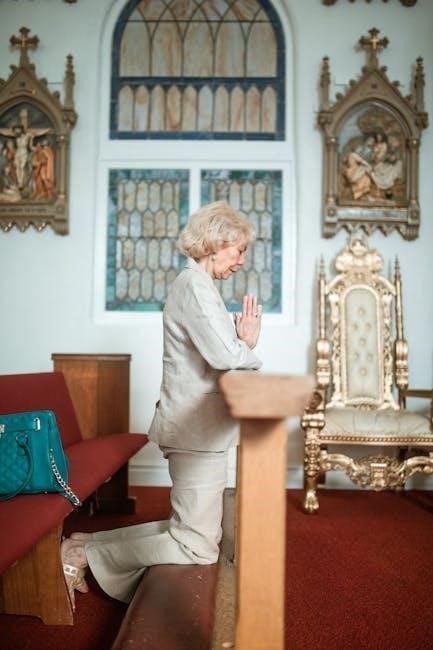
8.1 Decision-Making Processes
Elders engage in collective decision-making, guided by biblical principles and prayer. They prayerfully discern God’s will, considering the big picture and prioritizing the church’s spiritual well-being. Decisions are made collaboratively, ensuring unity and avoiding personal agendas. This process reflects their role as stewards, entrusted with leading the church wisely while maintaining accountability to God and the congregation.
8.2 Accountability
Elders are accountable to God and the congregation for their leadership. They must uphold biblical standards, maintaining integrity in their actions and decisions. Accountability ensures elders lead wisely and remain faithful to their calling. Failure to fulfill duties can result in consequences, emphasizing the seriousness of their role in shepherding the church. This accountability fosters trust and strengthens the church’s unity and spiritual health.

Resources and Training
Church elders can benefit from resources like books, seminars, and online courses to enhance their leadership skills. “Finding Faithful Elders and Deacons” by Thabiti Anyabwile is a recommended read.
9.1 Recommended Reading
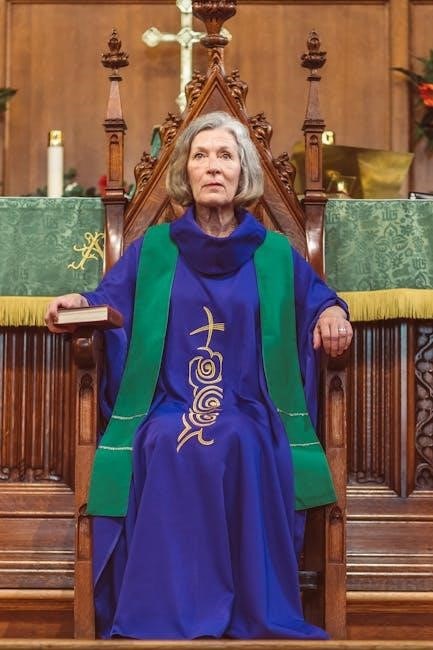
Church elders can deepen their understanding through books like “Finding Faithful Elders and Deacons” by Thabiti Anyabwile, which explores biblical qualifications and roles. Another recommended resource is “The Shepherd Leader” by Timothy Witmer, offering practical insights into shepherding the flock. These books provide guidance on spiritual leadership, discipleship, and protecting the church, equipping elders to fulfill their duties effectively.